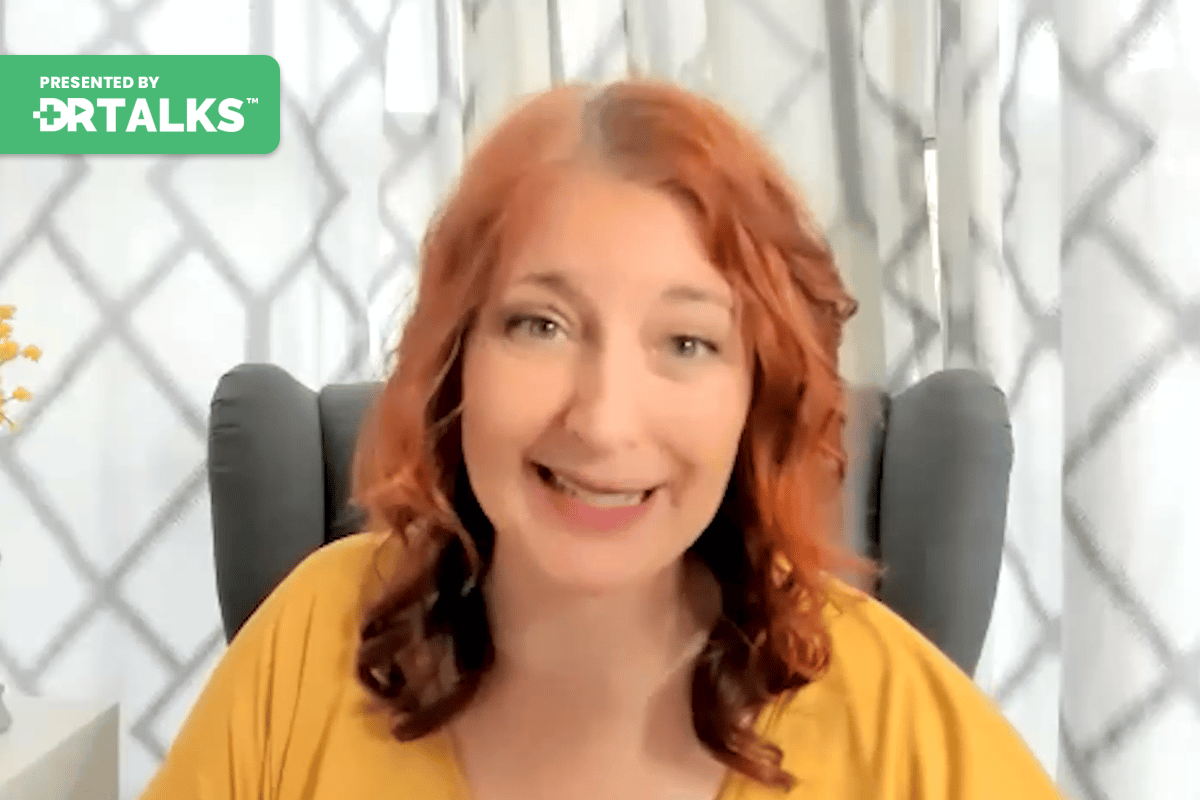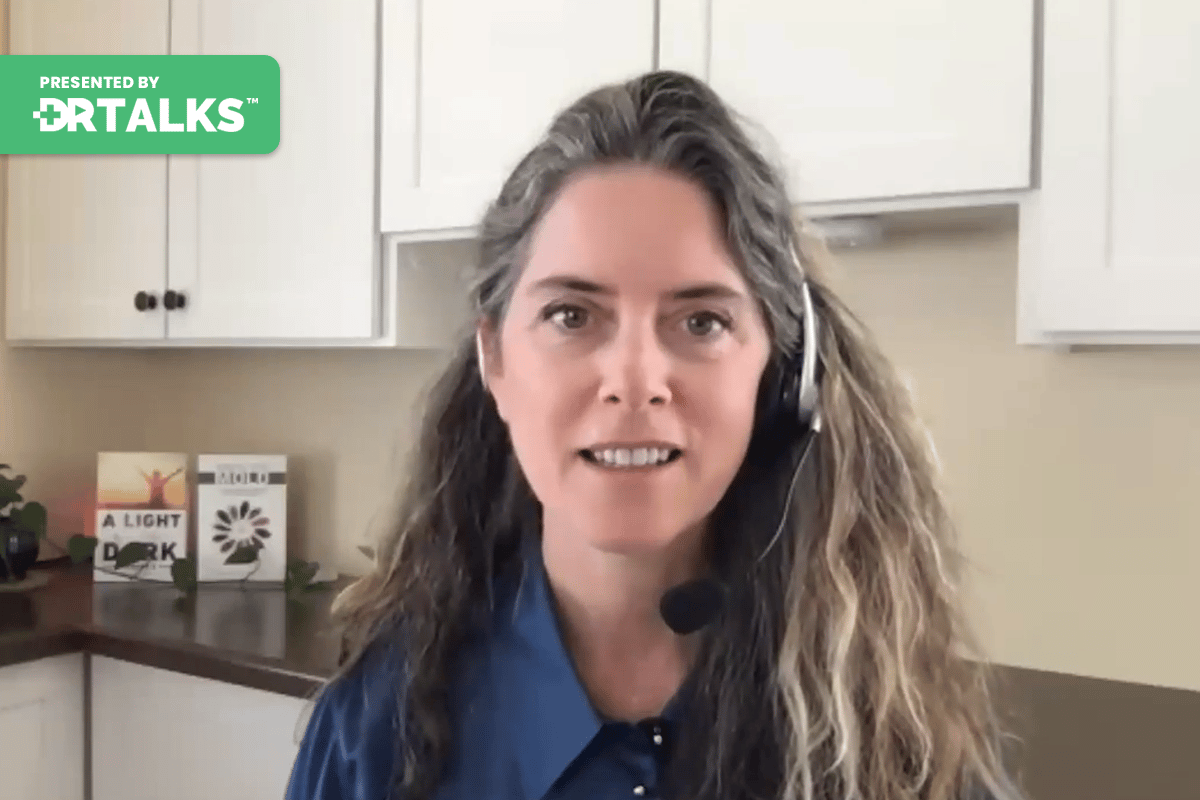Join the discussion below

Dr. Diane Mueller is the founder of My Libido Doc, an online community dedicated to helping women reclaim their desire. My Libido Doc provides education, community and health care services for women. Alongside her double doctorate in Naturopathic Medicine and Acupuncture, Dr. Diane extensively researches libido, pleasure and women's health... Read More

Betsy Greenleaf, DO, FACOOG (Distinguished)
Betsy Greenleaf, DO, FACOOG (Distinguished). Premier women’s health expert, entrepreneur, inventor, and business leader, who specializes in female pelvic medicine and reconstructive surgery for over 20 years, Dr. Greenleaf, is a trailblazer as the first female in the United States to become board certified in Urogynecology. She possesses a professional... Read More
- Learn how your vaginal microbiome is connected to mental health and even libido
- Learn about what causes vaginal microbiome issues, and what lifestyle decisions promote vaginal health
- Learn about clinical and easy at home tests you can do to see if your vaginal microbiome is healthy
- Learn easy to implement treatment strategies
Related Topics
Adrenal Glands, Antibiotics, Anxiety, Blood Flow, Circular Pattern, Cleansing Products, Cortisol, Depression, Gut Health, Hormones, Immune System, Infections, Infertility, Inflammation, Mental Health, Microbiome, Microbiome Imbalance, Reproductive Health, Serotonin, Sex Drive, Vaginal Microbiome, Vagus NerveDiane Mueller, ND, DAOM, LAc
Hey everybody Dr. Diane Mueller here, welcome back to another episode of microbes and mental health. I am so excited to have my friend, an amazing gynecologist Dr. Betsy Greenleaf with us today? Welcome to the show, Dr. Betsy
Betsy Greenleaf, DO, FACOOG (Distinguished)
Oh thank you Diane. I’m so excited to be here with you.
Diane Mueller, ND, DAOM, LAc
I’m so excited to have you. And let’s start out just with telling us how you got into women’s health, how you got into Ghana ecology, Tell us a little bit about your history.
Betsy Greenleaf, DO, FACOOG (Distinguished)
Yeah, so funny. You know, Gynecology definitely was the last thing on my list of things to do. You know? A lot of people always ask me like why did you want to go into a field where you’re looking at down there all the time? And it just kind of happened. Like I actually started out in medical school and then went into residency. I started out in general surgery but they didn’t have that connection with the patient. And I was the one walking around on rounds, you know, asking people after they had appendix out their appendixes out, like how do you feel now that your appendix is out? I feel now that your gallbladder is out. So then I ended up going, you know, I really kind of wanted to have more of a connection with my patients. So I ended up going into gynecology and you know, like you just become very desensitized to what you’re looking, I have a friend who’s a podiatrist. And remember one day in residency were eating lunch and across the table I said to her, how do you look at people’s nasty feet all day long and I think she almost choked on her sandwich and she was like, realize what you’re doing and I’m like, oh yeah, you’re right. I forgot.
Diane Mueller, ND, DAOM, LAc
Yeah, I feel that way too. I feel like even in medical school and doing rotations at like, like proctologist rotation, like, okay, by the end of it, you just kind of get used to looking at people’s butts and that sort of thing. Okay, so then what happened from there
Betsy Greenleaf, DO, FACOOG (Distinguished)
Specifically with the microbiome? You know, this was something myself that I suffered with for years from the time I went into puberty, like I was getting recurrent yeast infections all the time. And so going into gynecology and then actually Euro gynecology, it became the first board certified female Euro gynecologists in the country. I opened a practice doing pelvic health, women’s health, but then I also had a big focus on pelvic pain and specifically having to deal with recurrent bladder infections and vaginitis. And so it also kind of became my from the vaginal and having yeast infections all the time. It became my battle. Like, I’m going to figure this out because we weren’t really taught a lot about it in medical school other than like just throw some creams that people just throw some medicine. So it really became my lifelong obsession with, I’m gonna fix myself and then I’m gonna fix all my patients too. So
Diane Mueller, ND, DAOM, LAc
Yeah, yeah, I figured there was a story like that in there somewhere, usually there is, you know.
Betsy Greenleaf, DO, FACOOG (Distinguished)
Yeah. And then really, you know, when it comes to the microbiome, that also is not something that was taught in medical school and the more I get into the research on the microbiome, it’s like a whole new world, It’s just absolutely fascinating.
Diane Mueller, ND, DAOM, LAc
Well let’s go deeper into that because I think the microbiome for so many people, it’s like there’s such an emphasis right on the gut which is obviously important, but we forget there’s a microbiome in, you know, really throughout our body. So can you kind of just ground us in the foundation of the vaginal microbiome and why we have it, what it does, those kind of things?
Betsy Greenleaf, DO, FACOOG (Distinguished)
Yeah, I mean you kind of hit the nail on the head there, We have it all over our bodies. And we were talking about and I’m sure you’re talking throughout this whole summit about, we have like these little universes like our microbiome in our mouth is different than the one in our gut different than the one in our vagina. And I mean I also grew up, especially with my having young kids, I was the one the woman running behind them with the antibacterial soap germs are bad germs are bad and that’s probably the worst thing that somebody could do and we see that too from a gynecologic standpoint people are like always worried about what it smells like down there, what it looks like and they’re constantly using different kinds of soaps and perfumes and things are throwing off the microbiome. But what’s really fascinating. So the vaginal microbiome is very interesting and that it’s very acidic and so when we talk about the ph of water seven and the ph of the vagina when it’s in its normal range is 3.5 to 4.5.
And that’s because the healthy bacteria that lives in there, which is the species lactobacillus helps to keep the ph very acidic by producing peroxide. But what’s even more fascinating is when we’re young and we’re menstruating, we have all our hormones, the vaginal tissue is very thick and it’s actively growing. And so as it actively grows it pushes out the old cells and new ones are growing behind it. Those old cells slough off and they contain something called glycogen and glycogen is the food source of the lactobacillus. So as long as our tissue is healthy, we feed the lactobacillus and in return, the lactobacillus keeps us from getting vaginal infections, urinary tract infections. But now what they’re also finding is a connection to fertility and even sex drive when the bacteria is all in balance, which is really pretty fascinating
Diane Mueller, ND, DAOM, LAc
And I definitely want to hit on that cause I think there’s a really important point. I have lots of questions based upon what you said I wanted before we go deeper though, just because of our audience. I want to kind of ground this in the relationship of the vaginal microbiome, you know, ph what’s happening there, everything you just said and the relationship to when it’s out of balance and the creation of mental health imbalances. So can you Make that connection for us as a foundation and then we’ll kind of spin off from there.
Betsy Greenleaf, DO, FACOOG (Distinguished)
Yeah, and this is where you can get like crazy connecting things. So I always like to start in the gut because I think it’s almost the easier place to start because we could start any spots. But I find that start in the gut it tends to be easier. Well, we know that 90-95% of our happy hormone serotonin is made in our gut. We also know that 80% of our immune system is made in our gut. So if our gut is imbalanced, then that leads to inflammation and the rest of the body increased risk of infections, but also increased risk of anxiety and depression. Now, at the same time, if we start in the brain, so we know, okay, so the gut can affect the brain. So we know that if their gut is off, we have a higher risk of anxiety and depression, even like obsessive compulsive disorders, any of any of the mental disorders can tend to get worse. But then if you start it’s also start in the brain. So let’s say we’re a person who is really stressed out or is anxious or depressed that in itself can now create stress. Press is going to throw off all of our hormones, especially cortisol, which is made by our adrenal glands and then that’s going to affect our gut. So we have this circular pattern with the gut and the brain connecting. Well now we’re gonna throw in the vagina into all this like, okay, so what happens is I like to once again start in the gut that if the gut microbiome is off when we come down we look at our anatomy, we have the rectum, the anus is right next to the vagina is right next to the urethra, the Tpp through. So you have the urinary track, the reproductive track and the gastrointestinal tract also close to each other. And no matter how well we clean it’s very easy for back to pass back and forth.
So a lot of times the bad bacteria is coming from the gut and it’s getting into the vagina or we’ve lost the vaginal microbiome because we’ve been on antibiotics or we’ve used soaps or douches or you know, cleansing products that have thrown off that. And so now the vagina more often than not is a symptom of a larger problem going on. But what they’re also finding out is that if they totally confuse you here, I know this goes in like I love it that if the vaginal microbiome is off, it’s not just from an infection standpoint that there’s a feedback loop and they believe it’s through the vagus nerve which is responsible for that relaxation, parasympathetic rest and digest. But then there’s a feedback loop to our brain and our boy brain goes, oh wait, things are off downstairs. Like now is not the time to be reproducing and your brain doesn’t know the difference between you wanting to have just some fun time with your partner, with yourself versus you’re trying to make a baby.
So the brain just goes, we gotta shut down this whole thing and it will shut down any process of reproduction. So now we have low sex drive, we now have problems with infertility. And so and then we know that if that some people with the sex drive is low then that’s going to add more anxiety and depression. Yet at the same time, if we start in the brain and go to the vagina, if the brain is not where it needs to be, if there’s anxiety, if there’s depression, if there’s low libido, then it also feeds into our blood supply into the pelvic area and that we can’t really enjoy ourselves sexually if we don’t get enough blood flow. And if the brain is not in a place where it is willing to kind of get around, get aroused, then you’re not going to get the blood flow down below and you could be doing all you want below and nothing’s going to happen. So it becomes very circular how these all these like systems are interconnected and how they act on one another.
Diane Mueller, ND, DAOM, LAc
Yeah I really love that and I think the point you’re bringing into about the libido and fertility and all that super important cause so many times I think people with depression anxiety or other types of mental health and balance is it’s so easy to just say well I don’t have a sex drive because I’m depressed and all the things that go with it. But you know kind of what we’re saying here is like well there could be this root cause and the vaginal microbiome that is actually leading to both of those things. And it’s not really the depression causing say the low libido in this situation it’s actually the vaginal microbiome like sending these signals that are leading to that essentially. Right.
Betsy Greenleaf, DO, FACOOG (Distinguished)
Yeah. And then the other thing is in some people the microbiome will cause inflammation and now when we have inflammation in the vaginal area that we have pain and when we have pain we regulate our receptors from our nerves in our pelvis through our spinal cord to our brain. And if that pain goes beyond three months now we start getting physical structural changes in the brain from up regulating these pain receptors and where they actually did functional M. R. E. S. Of people that were in chronic pain and they found that their brain structure was physically different than somebody wasn’t experiencing pain. And then they know that from that physical change in the brain structure that those people report also higher incidences of anxiety and depression along with the pain. And it’s interesting because they’ve been a number of studies of partially some stage where they’re balancing the microbiome and people got better some people where they just put them through meditation, yoga, acupuncture, creative visualization, the brain got better and then their symptoms got better and so you know it’s amazing like all these systems interconnect. So
Diane Mueller, ND, DAOM, LAc
Oh it’s so is and and let’s go deeper into the symptoms because I think when it comes to any sort of vaginal issues most women tend to just think about a problem when say there’s a change and odor, maybe there’s paid with sex or you know just actual you know vaginal pain. So now we’re bringing in possible you know libido changes or fertility changes as being symptoms that could mean a vaginal microbiome. You know dis bio sis situation. Are there any other symptoms that people should really be considering beyond what we’re talking about here?
Betsy Greenleaf, DO, FACOOG (Distinguished)
You know the one just popped right to my mind was food cravings because you know for people who especially like with anxiety and depression associated with food cravings especially for sweets more often than not there tends to be a yeast overgrowth in the gut and then can lead to recurrent yeast infections. And I find that if we don’t like the women that are going to the pharmacies and getting the medicines for the yeast infections constantly and they’re they’re like I’m not getting better, I’m using this yeast medicine well because there’s underlying yeast in the gut that is kind of feeding the vagina. But then yeast likes to live off a sugar. And so the fact that somehow this yeast is triggering a process in our bodies to cause food cravings in our brain is absolutely amazing that there is that connection. So
Diane Mueller, ND, DAOM, LAc
Yeah, yeah, that’s a really, really useful one for people for sure.
Betsy Greenleaf, DO, FACOOG (Distinguished)
I think the biggest thing too that people just tend to cover up because they think, oh it’s just like being a woman is the odor odor is a big, big issue that people are very self conscious about and there are tons and tons of products on the market that cover up odor. When I say odor is just odors just caused by bacteria, it was just like sweat itself. Sweat doesn’t have an odor. It’s not until it combines with the bacteria on your skin that the odor is produced the same thing. If there’s an odor in the pelvic region, it’s because the bacteria that’s present and covering it up with perfumes and fancy body washes are actually only going to make the situation worse, especially if we’re using those washes which are going to further throw off the ph so I think that tends to be one, you know just from like what people may feel if their vaginal microbiome is off. Sometimes it is a heavy discharge a lot of times.
It’s like if you get like an eyelash in your eye and your eyes just like tearing, well that’s your eye, trying to like wash that eyelash out when the vagina has a discharge because something is off and it wants to flush it out. Now we normally make a discharge but it’s like if it’s different than what you normally experience, it could be because the body’s trying to flush out something that’s not supposed to be there. So itching burning discharge odor, recurrent bladder infections when we were like, okay, well we have that related to the vagina. Well once again, if the bacteria in the vagina is off, you can easily get into the urethra which is a to B. P throat, get into the bladder and now you have a recurrent vaginal infection, bladder infection.
You know, if you get taking antibiotics all the time to treat your bladder infection, you could be further throwing off your microbiome of your gut and now we’re now you’re in this cycle of having these things repetitive lee. And I have seen women no joke who said, you know one first of all, one course of Cipro which is a commonly prescribed antibiotic for urinary tract infections it can throw off your gut microbiome for a whole year. And I’ve had women that come into my office with recurrent bladder infections and they’re like I wasn’t depressed until I stay started getting these infections and I’m like yeah well because these antibiotics you’ve been on have now further thrown off your microbiome, you’re probably not making any serotonin you’re happy hormone. And we also know I mean there’s other neurotransmitters that are made in the gut you know dopamine gaba these are other neurotransmitters that help with happiness. So and then you want to add into the gut microbiome is off. Some people are more have a more tendency to get constipated and when we’re constipated the body will actually absorb estrogen’s reabsorb estrogen out of that stool back into our system. And then that throws our hormones off we have more problems with estrogen More more mood issues. So it really comes down to like you know keeping that microbiome as healthy as possible.
Diane Mueller, ND, DAOM, LAc
So when it comes to that like how often do you think that people are actually saying having some sort of say pathogenic bacteria in their gut or in their urinary tract or in their vagina and they’re actually passing it from one location to another and they’re not getting better because whatever treatment they’re doing is really more targeting you know the bacteria in one place and then it just you know we treat it there and then it just migrates back there from another location in the body. How often do you think that’s happening?
Betsy Greenleaf, DO, FACOOG (Distinguished)
I think I mean people that are having that recurrently it’s all the time. I mean my whole practice, 20 years of practice. I mean of course I’m seeing all the people that are suffering from this. But then do you think about how what about these people who are not getting, you know, if you’re getting pelvic symptoms, it’s almost like good because it’s your vagina screaming for help. But what about like I always wonder about these people that are just suffering from anxiety and depression and don’t have any other bodily symptoms that are overt. You know, I can tell you myself before I got into functional medicine, I had a hysterectomy and was having a lot of problems with anxiety and depression and I just was blaming it on my hormones. Never once thought about my microbiome. It wasn’t until I got into functional medicine and then years later I was seeing a immunologist cause I was getting sick all the time. Like any cold. Like I got it like when you know, forget about covid when the swine flu came around and like you have to have left the United States to get the swine flu.
I had not left New Jersey and I got the swine flu and I was like what is going on? And it wasn’t till I got the functional medicine, I go wait a minute, what is anxiety, depression, and the mutant issues have in common because antidepressants weren’t working and I couldn’t understand why, and then, you know, I’m like, wait a minute my gut, and so I went, I got my gut microbiome tested and I was getting recurrent bladder infections, recurrent urinary tract infections, get my gut tested and wouldn’t, you know, it was completely off and so spent, you know, spent six months to a year balancing my gut and then, you know, I don’t want to, you know, I do think for some people, antidepressants in the psych medicines are needed, but in my case, I was able to get completely off in a depressant. Never been happier in my life, you know, and all my immune system, my immunologist was like, I have good news and bad news, the good news is, your levels are all normal, The bad news is I have no clue why. And I went, I know exactly why I balanced my gut, stop getting urinary tract infections, stopped getting vaginal infections, I’m like, well, if I had only known about this years ago, this is, and this is why too, like, I get crazy with my kids, you know, you know, kids always want to eat candy, and I’m like, like, I wanna, I don’t wanna be that mom, that like, like, no, you can’t eat anything, we’re just gonna eat, like, like I grew up, my mom was like, we’re only eating wheat germ, because at that time in the seventies wheat germ was like, the healthy thing to do.
But I’m like, I don’t want to have them have issues with anxiety and depression, because we’re seeing so much of that in the United States, and I’m like, well, no wonder, because we’re feeding kids sugar cereal in the morning and then sending them off to school and then look at the American diet. No wonder we have a mental health crisis. From a microbiome standpoint, you know, it’s not the only factor, but if everyone’s eating these horrible foods and throwing up our guts, it makes sense that we’re having these kind of issues.
Diane Mueller, ND, DAOM, LAc
So, I’m sure one of the things that people are thinking about right now is like, okay, well, how do I know if I have a problem, especially if there are, say are not a lot of vaginal symptoms. And really, let’s just say, if it’s somebody that has really just focused symptoms that are mental, emotional and so, you know, we’ve already talked another interviews about gut testing, that sort of thing. So, but if somebody wants to go and say test their vaginal microbiome and say, is there a problem here, do I have an issue here? You know, is this contributing to my symptoms of mental health symptoms? What do they do? What do you recommend?
Betsy Greenleaf, DO, FACOOG (Distinguished)
Yeah, I mean, there’s so many different ways. Let’s just start. I mean I prefer testing because I think being a scientist, I love to know exactly what we’re dealing with. And there’s a number of commercial tests that are out there on the market, like some of them, for example, you can go to get your own test through a company called Juno bio and you can just order it, pay for it, get the results and there you go and and then you have to take it to your doctor who has to help you interpret it. But then there’s other ones that are covered through insurance and so there’s a whole range of agile microbiome testing. I’m sure you’ve talked about stool testing. I like stool tests. I like combining the two because we really know that the stool in the gastrointestinal tract is where a lot of these things are kind of happening. But I think the other thing is we can look at just diet and I always tell people your criteria of what you should be eating is anything that grows walks, flies or swims and so like twinkies don’t grow on trees. So we go, okay, no twinkies, vegetables, all right, that’s good. But you know, sometimes I’ll hear people like use some of the processed foods that maybe once started off as a vegetable and once you process some foods, they are no longer as as vegetable lee as they once were. But you know, the more that we can get them to where they were walking or growing or swimming or flying, then that’s gonna be the key and that you know, humans, we didn’t like evolve to have refrigerators. You didn’t see the caveman like walking across, getting out of his cave, walking across the savanna just so we can open his refrigerator. I mean refrigerators are great. We can keep our food for a lot longer. But we’re not eating as much bacteria that we used to. So we’re not gonna get more bacteria into our bodies and that’s gonna be with fermented foods or probiotics. You know, it’s like fermented foods. We got kimchi or sauerkraut or yogurt. I know people get on me about the yogurt thing because of being dairy, but there’s a lot of non dairy options.
And I think dairy is always like is one of those things that’s in a good carry category or bad category keeps going back and forth if you don’t have problems with dairy, I’m fine with the dairy. So kombucha, which is fermented tea, which is actually pretty easy to make. I have like a whole jug of it that I make in my house so constantly just, we really should be eating some sort of fermented foods every single day. And then the other thing is getting more fiber, we know like in general for Americans and I’m sure there’s people listening all over the world to this, but specifically I know from Americans we are grossly like deficient in fiber. So you’ve got to get at least 25 g of fiber a day. And that fiber is the food source for your healthy bacteria because remember like we talked to the vagina, we’re not feeding that healthy bacteria, it’s going to go away when it goes away, all the bad guys start moving in so other stuff is gonna start taking over. So
Diane Mueller, ND, DAOM, LAc
Yeah and just throw something else in here. I have your back with the dairy thing. I get kind of a hard time for people to and that I think sometimes it’s healthy for people you know full fat organic, not with sugar at it? And the yogurt and all that kind of stuff will do well on it. So where you can throw me in that camp if people give you a hard time I get it too. So my question is, and like thinking through all of these lifestyle things you’re talking about, you know fermented things fiber so we want to diet clearly is one of the reasons why I say the microbiome would get out of balance. Obviously we’ve mentioned microorganisms or using products like douches and things that would change the vaginal ph is there anything else that really is going to cause the microbiome to be out of balance that we haven’t talked about.
Betsy Greenleaf, DO, FACOOG (Distinguished)
Yeah the big one is stress. The big one is stress and that’s the catch 22 because if you’re stressed then you have more anxiety and depression, your anxiety and depression may be causing more stress. The more stress you have from that, the more it throws off your microbiome, the more your microbiome is thrown off, the more anxiety and depression and illness you have. So it’s really, you know, stopping taking a moment and there’s so many different amazing things that you can do from meditation. And I know sometimes when I mentioned the patients meditation, I do get some pushback on that one because they think they should be sitting cross legged on the top of a mountain for hours and hours. And honestly, even if it’s just five minutes, like shutting your eyes, tuning out the world, taking some deep breaths. That is a great thing. Stress can also come and other, you know, diseases.
That is definitely a stressor. But also we’re sitting in front of screens constantly and we were, we evolved to go to sleep when the sun goes down and wake up when the sun comes up. And so when we’re constantly in front of screens that’s affecting our circadian rhythm and so more sleep is one of the best things you can do for your health and for decreasing stress, giving your brain some time to just process things, getting off the phone. I know everybody wants watch 11 last real or Tiktok before they go to bed, but get those things out of the bedroom, don’t look at it. You know, Try to go to sleep more. Try to get at least eight hours of sleep. But I tell people, because you can’t go from like sleeping five hours a night to all of a sudden, like eight hours because then you’re like lightning there staring at the ceiling.
But I always tell people they back it off by 15 minutes, like every day, every couple of days, every week until they get into a better pattern. Dehydration, 75% of Americans are chronically dehydrated. And that’s a stressor on, on the system that also we’re not drinking enough fluids that throws off our microbiome. So that also when our brain is dehydrated that causes headaches, that causes more anxiety, depression, brain fog. So, really drinking enough fluids.
I always say a good way to tell if you’re drinking enough as if your urine is clear than you’re drinking enough. But a lot of people want numbers and those numbers have changed over the years. The most recent one I’ve seen recommended in literature has been like 96 oz of water a day. So I just just keep drinking fluids during the day and try to, you know, get that hydration level up. Trying to get those like, you know, there’s just so many simple things, you know, also from a relaxation standpoint. I was just talking to another one of our colleagues earlier today about breath work. And I was fascinated to find out that just like breathing through your nose has this effect on your whole psyche and hormone levels. Like I was, it was shock shocking to find out more about the breath work, but I think I’m big on people getting hobbies because hobbies are a great way to relax. I know you both you and I like to dance so you know like I hate exercise because too much exercise can be a stressor and can be throwing off all the bike around and also forget about it if you’re exercising in those little lululemon, sorry lulu, lemon. But you know if you’re exercising in your you know your little pants that don’t breathe, you know, get out of those things at the end of your exercising, let the vagina breathe, lift the pelvic area, breathe. So I know we’re really talking about women a lot with this with the vagina, but there have been studies that show for men to if their gut microbiome is off. They also will have problems with and we know that have problems with anxiety, depression, but also they will get issues with libido and fertility and fertility too. So
Diane Mueller, ND, DAOM, LAc
You’re making me think about, I had a cute conversation with my friends child who somehow got into conversation around wanting to not wear clothes at night when she slept and so she was talking to me and her and her mom, my friend about this. And one of the things she said is like, well it just has to breathe down there. So I thought it was really cute, you know like like in this conversation we’re talking about it like how amazing is this, that this like child just like following her natural feelings is like doing these things and saying she wants these things that are actually what we’re talking about here, that’s part of health and wellness.
Betsy Greenleaf, DO, FACOOG (Distinguished)
You know that made me think of a story when my girls have two girls when they were younger and they used to wear skirts, you know they’d wear their skirt and they’d wear their underwear and then they were wear bike shorts on top of that to cover up their underwear, which I understood like they didn’t want anyone seeing their underwear but the whole reason we wear underwear because we’re covered going up. But honestly the more like constrictive clothing, the more layers of clothing we don’t get air and especially yeast, yeast likes a warm, wet dark environment.
So now I’m not saying go out in your backyard and spread eagle with your name like air it out. But there was, there was actually an actress that was doing that for a while, I can’t remember what her name was but she would like lay in her backyard in the sun but you know, at least come home change into like loose sweatpants, you know, you know, if you’re not sleeping naked, then sleep with just like, you know, sweatpants, boxer shorts, something loose to get some air, let let the air circulate in that area. So, you know, I actually had a Tiktok that went viral not too long ago talking about how to properly wash. And you know, it’s surprisingly this woman posed this question like, hey, what is the right way to wash down there? And I was surprised that, you know, none of us were really taught that way. And from a gynecologic standpoint, we always tell people just water, all you need is just water. And there were some people that were like, what, what do you mean? Just water? Like how is that gonna clean me? How is that going to get rid of the odor? Well, first of all, we said the odor is not from you being dirty, that’s from the back to Europe being off and all the soap in the world is not gonna fix that, it’s actually gonna make it worse. But water is a universal solvent, it will dissolve most things. And the thing, it doesn’t dissolve in oil where our oils and our skin, our protective, especially for the tissue down there is very delicate. So, and then there’s some people are just like, well, I’ve been using soap for years and I haven’t had a problem. Well that’s great if you haven’t had a problem, you know if it’s not broke, don’t fix it. And if you want a soap then then I tell people well then look for some of the more mild soaps. There is a company that I love PhD feminine health.
They make a new, they make a boric acid wash, boric acid is very acidic. So it also helps to solidify back down down there. So that helps with balancing out the ph they’re steel soap can be very gentle. Some people like Dove though I found and that ends up getting kind of recommended like the sensitive wash but I want to find his hair. Miss some people do find with that some people it can irritate them. I think the biggest thing is you want to stay away from things with dyes and fragrances and you don’t need all these you know bath and body works types of soaps. That can be very irritating because not just not just the so part of it could be all these other added chemicals that are in them. So
Diane Mueller, ND, DAOM, LAc
Makes me think of a conversation I had years ago with a colleague and you know we get into the strangest conversation sometimes and I was in this conversation and he was talking to me, he’s like, I don’t know why in society we are not program to wash our hands before we go to the bathroom in addition to after. And basically that you know what he was saying is conceptually our hands are actually probably full of way more bacteria than our genitals. So you think that would be like a positive thing for you when we’re talking about all these different lifestyle strategies you mentioned, do you think that would provide any value for people from a vaginal health perspective?
Betsy Greenleaf, DO, FACOOG (Distinguished)
Yeah, definitely, definitely. And then you know it also comes, you made me think of two other things is the wiping direction for women because we have, let’s say we have your urethra, the tube ep through then the vagina and the rectum. So you want to make sure you’re wiping away from the urethra towards the rectum. And I get a lot of women who are like I just can’t figure out the angle to how to do that. Like after I urinate. Well then the other thing is you can just dab in place, don’t wipe just dab. And that’s probably better. And then another thing I’ve seen patients do over the years is you know our toilets unfortunately are not the cleanest things in the world. And so I’ve had patients over the years and it’s funny because you don’t ask until all of a sudden you try to go figure out why are they getting these recurrent urinary tract infections. Well they were sitting on the toilet and flushing. So when you sit in the toilet and you flush you get that movement of water which also tends to aerosolize some of the bacteria that is in in the toilet and that bacteria is now just landing on your bottom. So I always have people like get up from the toilet if it’s got a lid put the lid down because you don’t want all that bacteria like spreading all over your bathroom or put the lid down if you can if you’re in a public toilet just kind of like pull your pants up, get everything else up before you even flush. So we’re avoiding that that whole like getting that on you.
Diane Mueller, ND, DAOM, LAc
Yeah I love these topics. These are really important topics that are just almost like a little taboo to talk about but super important and just like day to day lifestyle decisions. What about hormones? We haven’t talked about hormones. You want to say anything about hormones and relationship to them.
Betsy Greenleaf, DO, FACOOG (Distinguished)
Yeah so here’s where it gets, it gets a little tricky with the vagina. So we’re talking about in an ideal situation, we have someone who’s menstruating the vagina is making a new healthy cells and the cells are getting you know the lactobacillus bacteria is getting fed by those the sloughing off of those healthy cells. Well then what happens when all of a sudden your hormone levels are low? That’s a big problem. So whether that’s from pregnancy we get a drop in estrogen breastfeeding women on birth control you’re taking hormones. But you’re actually decreasing your levels of hormones and so we don’t get that nice healthy growing of the vaginal tissue and women in menopause.
So now what ends up happening is that vaginal tissue thins out, It doesn’t actively slough off the lacto bacillus is running around like going feed me, feed me and there’s nothing to feed it. So now this is why the lactobacillus is dying off. And now we have such a higher rate of these conditions during those times, you know on top of the mental health aspect of hormones or neurotransmitters. So estrogen, progesterone, testosterone all have effects on our brain. So they help you know this is why we have increased anxiety, depression, brain fog. If we have too much we can get aggression. So we got the hormones themselves acting as neurotransmitters. We have the microbiome of the vagina shifting because we’ve lost the lactobacillus. And so now people go well now what now what do I do? So a lot of times we have to start looking at all the regenerative techniques for the vagina. Now in pregnancy we don’t tend to do anything that tends to be more of like a watch and weight. Same thing with breastfeeding you can do some of the regenerative therapies but a lot of times it’s a watch and wait but then when we talk about menopause and birth control now we may there may be things to do that. You can add to the vagina or treatment you can do the vagina to get that tissue to regrow. Number one, it maybe adding some hormones back to the vagina, whether that’s in a cream, a tablet, a ring that’s worn in the vagina, anything that will provide that tissue, some hormones whether it’s estrogen testosterone even in the vagina or something called D. A. G. A. So any of those hormones in the vagina can help that tissue to regrow. Some people who don’t want to use hormones then we’re talking about you know, I always forget to mention this one. There is a prescription medication call I think it’s Tina that it’s not one of my favorites.
And this is definitely not if you’re in this is only if you’re postmenopausal, it triggers the body to think that it’s there’s estrogen there and it’s not. That triggers the vaginal tissues to believe that there’s estrogen when it’s not. But it still has the same risk factors of any hormones. And then actually started in 2014 in the United States, we started having more of the regenerative therapies. We’re talking like lasers. So that’s been a whole new world where lasers have been used since the 80’s cosmetically to rejuvenate skin and they realize whoa, wait a minute. If we can rejuvenate skin appear, what can we do down there. So lasers use light energy energy and the light just penetrates the tissue, makes a microscopic injury which sounds terrible, just like a little microscopic smaller than a pin point disruption in the tissue.
And it triggers the body to want to heal. And so as the body is flooding that area with growth factors, the vaginal tissue will regrow without the use of hormones. Then we’re gonna see sometimes I have one of my little devices here. Then they had radio frequency which is another show you what I have here too. Will do show and tell radio frequency which is using heat using sound waves to generate heat to regenerate tissue. That’s something that can be done. So lasers and radio frequency platelet rich plasma using your own blood and taking out the plasma in the blood and injecting in and around the vaginal area. Can get it to regrow.
Those are all therapies that have to be done you typically by a practitioner and then we have some home therapies. One is I’m gonna see if I can turn this on and show you guys some fun toys. But this is the Goldilocks red light device. And so kind of it’s kind of close read and is placed into the vagina. But we know that red light is very stimulating to the tissue tissue to regrow. So now let me show that off before I blind you all. So using red light therapy anywhere on the body but specifically in the vagina. Can get that badge on tissue to regrow. And there’s also something called car boxy therapy where they take a carbon dioxide that’s been made into a gel form and that’s placed in the vagina and it tracks oxygen into the tissue and it triggers a tissue regrowth. So every time we turn around, they’re coming out with new things to rejuvenate and regrow that tissue, which not that is not only great for sexual comfort but is wonderful for the microbiome. So yeah
Diane Mueller, ND, DAOM, LAc
Such a great techniques and tools. And what else do you think in our last minutes together, what do you think we haven’t covered? That’s really important to say today,
Betsy Greenleaf, DO, FACOOG (Distinguished)
Oh, you know what? I was just going to talk about their easy ways. I’m gonna show you something easy ways. You can tell if your microbiome is off without having to go crazy. With the specialty testing, which I love, the specialty testing. To one of my tricks is just ph paper is that you can get ph paper pretty much anywhere. I saw it on my store wink wink. But and you want to just see if the ph is within normal limits and then there’s ways to actually acidified the vagina if it’s not in one of my favorite. Also show and tell products is boric acid. So using boric assets repositories will help re balance the ph and if the ph is rebound, sometimes that will invite the healthy bacteria, it will chase away the bad guys and invite the healthy bacteria in.
But you know when it comes to last minute things it’s really a whole body wellness and for too often in traditional medicine we look at the different parts as being separate when really there’s this gross interconnection and gross. I mean like amazingly big interconnection between all our body parts and our body functioning. And so from a mental health standpoint, if you’re struggling with mental health, one of the things I would recommend is let’s look into other areas of the body that may be contributing to this that we’re not thinking of. So you know, and also at the same time if you’re under a lot of stress, let’s figure out ways to diffuse that and redirect it and come up with other strategies because staying in a stressed state too long can affect the function of your other areas. So
Diane Mueller, ND, DAOM, LAc
Yeah. Yeah. I think that’s one of the biggest take home points that I hope everybody’s getting out of this summit is we’ve got to start thinking about mental health and balance is beyond what’s happening in the brain and really look at all of these root causes like what you know you’re presenting today Dr. Betsy. So I really appreciate you bringing so much awareness to vaginal health and the vaginal microbiome and all the root causes and really cool testing and treatment options.
Betsy Greenleaf, DO, FACOOG (Distinguished)
Awesome. Thank you. I’ve had so much fun doing this with your Dr. Diane.
Diane Mueller, ND, DAOM, LAc
Me Too. Me too. And I want to make sure we tell people about how to reach your store and you guys just so you know some of the things we’re gonna talk about here will be in Dr. Betsy speaker bio. So make sure you check that out. But I want to talk a little bit about your giveaway and you also have a discount coupon for us at the store. So can you tell us a little bit about your Give away first?
Betsy Greenleaf, DO, FACOOG (Distinguished)
Yeah, so first of all I have a 20 minute pelvic meditation and so talking about bringing down stress, you can watch it, there’s a visual part, two part to it or just listen to it with headphones and so this will help balance hormones, help with decreasing stress, you know, which will aid in healing and leaky gut and vaginal. And it was specifically the sounds picked in this meditation were actually frequencies that have been known to support the pelvic chakra and then also which I think was just so fascinating. It has something called by neural tones and so there’s slightly different tones in each ear and when you listen to that especially with headphones it’s actually been shown to decrease some of the brain activity and decreased anxiety. So I’m very excited about producing that. And then we have a discount code for you to go to the pelvic floor store where you can find some of the fun products I just showed you today and some probiotics and we’re always adding things to there and look for some courses that we’re doing. And the other website I’d just like to drive you to is for diversity where we have courses where you can learn how to do this kind of balancing for yourself. And also if you’re a practitioner, we teach practitioners how to read and understand these testings. So
Diane Mueller, ND, DAOM, LAc
Awesome. Yeah, we’ll have, like I said, we’ll have all of that. So don’t you guys missed any of that. Don’t worry. Just check out the speaker bio. It’s in there for you and thank you again. Thank you again so much for being here with us today. It’s been so delightful.
Betsy Greenleaf, DO, FACOOG (Distinguished)
Oh, thank you.
Downloads










